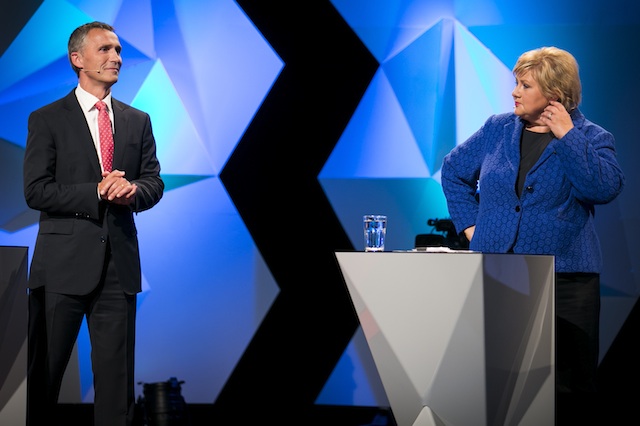SUMMARY
This is AI generated summarization, which may have errors. For context, always refer to the full article.

OSLO, Norway – Norwegians look likely to vote the center-right opposition into power Monday, Sept 9, raising the prospect of a populist, anti-immigration party entering government two years after right-wing extremist Anders Behring Breivik’s deadly rampage.
Voting will open at 9:00 am (0700 GMT), one day after a survey in the daily Aftenposten showed 54.3% of voters backed the four center-right parties. That would give them a comfortable majority of 95 of 169 seats in parliament.
“It looks very good, it really does,” said Erna Solberg, the leader of the largest of the four parties, the Conservatives, according to Norwegian news agency NTB.
“But I’m still excited about a lot of things, not least how many votes we get. We need a strong mandate from the voters to be able to form a forceful government.”
Incumbent Prime Minister Jens Stoltenberg’s center-left coalition, composed of his Labour Party, the Left Socialists and Centrists, garnered just 39 percent of voter sympathies in Aftenposten’s poll. That would translate to 68 seats in parliament.
But Stoltenberg insisted on Sunday: “I have a very good gut feeling.”
Describing himself as “an optimist by nature”, he pointed out that half a million of Norway’s 3.64 million voters remained undecided on the eve of the election.
However, Bergen University political scientist Frank Aarebrot said the last time an election result was as easy to forecast as this one had been in 1953.
“I think nobody really believes that the red-green coalition (the ruling Labour-led coalition) can win the election. Nobody,” he said.
The center-left has been in government since 2005, an unusually long tenure in Norway.
It is seen as suffering from power fatigue, even though the oil-rich nation enjoys exceptionally robust conditions for a European economy, with almost no unemployment and very high living standards.
“If we change the government from time to time, every election or every second election maybe, it’s good for the country,” said businessman Stig Bredal Eriksen. Eriksen is based in the western town of Bergen, hometown of Conservative leader Erna Solberg, who is tipped to become the next prime minister.
Stoltenberg’s coalition has also been criticized for the authorities’ failures to prevent Breivik’s July 22, 2011 attacks. He killed 77 people when he set off a van bomb at the foot of the government offices in Oslo before opening fire on a Labour youth camp on Utoeya island.
In an ironic twist, the right-wing’s widely anticipated victory is expected to open the door for the populist Progress Party to join government for the first time in its 40-year history.
The party is anti-immigration, and Breivik was a member until 2006, even if it has since disowned him.
The party has also toned down its rhetoric on immigrants, and no one in Norway associates the party with the carnage wrought by Breivik — an issue that has been conspicuous by its absence from the campaign.
Instead, the issues that dominated the run-up to the election were healthcare, education, taxes and how to best use Norway’s vast oil wealth.
“I do believe that Breivik is irrelevant” to the campaign, said Peter Linge Hessen, a young Labour party campaigner who survived the Utoeya massacre.
He was “obviously disappointed that the right-wing Progress Party has gained so much influence — but that’s democracy”.
The Progress Party, led by Siv Jensen, has been credited with around 15 percent support in the polls, down by about a third from the last election in 2009.
The most likely scenario is a minority government made up of the Conservatives and the Progress Party. The smaller Christian Democrats and the Liberals would not be in the government due to disagreements with the populist right, but would provide backing in parliament to pass legislation.
Significant differences divide the four parties, in particular the issues of immigration, the environment and how to use Norway’s oil fund — the world’s largest sovereign wealth fund worth some $750 billion (570 billion euros), which the populists want to dip into to finance their election promises. – Rappler.com
Add a comment
How does this make you feel?
There are no comments yet. Add your comment to start the conversation.